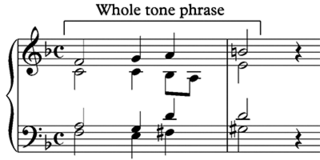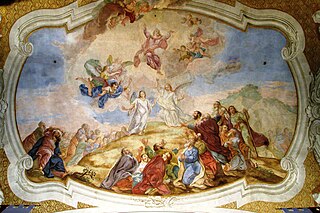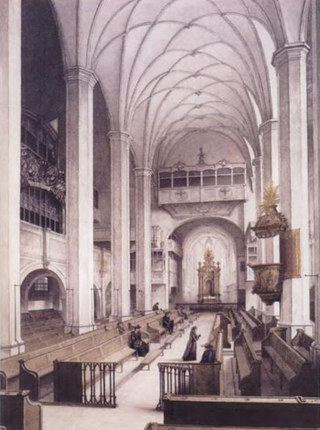Related Research Articles
Willy Burkhard was a Swiss composer and academic teacher, influential in both capacities. He taught music theory at the Berne Conservatory and the Zürich Conservatory. His works include an opera, oratorios, cantatas, and many instrumental genres from piano pieces to symphonies.

Klaus Huber was a Swiss composer and academic based in Basel and Freiburg. Among his students were Brian Ferneyhough, Michael Jarrell, Younghi Pagh-Paan, Toshio Hosokawa, Wolfgang Rihm, and Kaija Saariaho. He received the Ernst von Siemens Music Prize in 2009, among other awards.

Tönet, ihr Pauken! Erschallet, Trompeten!, BWV 214, is a secular cantata by Johann Sebastian Bach, composed in 1733 for the birthday of Maria Josepha, Queen of Poland and Electress of Saxony. Classified in published editions as a dramma per musica, it is based on a libretto by an unknown author. The piece has the dedicatee addressed by allegorical figures representing Roman and Greek goddesses of war and peace. It is structured as nine movements, and scored for four vocal parts and a festive Baroque orchestra with trumpets, timpani, flutes, oboes and strings. Choral movements frame a series of alternating recitatives and arias. Bach led the first performance with the Collegium Musicum at the Zimmermannsches Caffeehaus on 8 December 1733.

Kurt Georg Hugo Thomas was a German composer, conductor and music educator.
Gächinger Kantorei is an internationally known German mixed choir, founded by Helmuth Rilling in 1954 in Gächingen and conducted by him until 2013, succeeded by Hans-Christoph Rademann.
Kurt Huber is a Swiss tenor for concert and Lieder.

Ärgre dich, o Seele, nicht, BWV 186 is a church cantata by Johann Sebastian Bach. He composed it originally in Weimar in 1716 for Advent, BWV 186a, and expanded it in Leipzig in 1723 for the seventh Sunday after Trinity, where he first performed it on 11 July 1723.

O Ewigkeit, du Donnerwort, BWV 60, is a church cantata for the 24th Sunday after Trinity composed by Johann Sebastian Bach. It was first performed in Leipzig on 7 November 1723, and is part of Bach's first cantata cycle. It is one of Bach's dialogue cantatas: its topic, fear of death and hope of salvation, plays out mainly through a conversation between two allegorical figures, Fear and Hope.
Wolfgang Schäfer is a German choral conductor and academic. He founded the Freiburger Vokalensemble, the BosArt Trio, and the Frankfurter Kammerchor.

Wachet! betet! betet! wachet! is the title of two church cantatas by Johann Sebastian Bach. He composed a first version, BWV 70a, in Weimar for the second Sunday in Advent of 1716 and expanded it in 1723 in Leipzig to BWV 70, a cantata in two parts for the 26th Sunday after Trinity.

Himmelskönig, sei willkommen, BWV 182, is a church cantata by Johann Sebastian Bach. He composed it in Weimar for Palm Sunday, and first performed it on 25 March 1714, which was also the feast of the Annunciation that year.

Auf Christi Himmelfahrt allein, BWV 128, is a church cantata by Johann Sebastian Bach. Bach composed it in Leipzig for the Feast of the Ascension and first performed it on 10 May 1725.

Wer mich liebet, der wird mein Wort halten, BWV 59, is a church cantata by Johann Sebastian Bach. He composed the cantata for Pentecost and probably first performed it in Leipzig on 28 May 1724, but an earlier performance on 16 May 1723 at the Paulinerkirche, the University Church of Leipzig, is possible.

Liebster Immanuel, Herzog der Frommen, BWV 123, is a church cantata by Johann Sebastian Bach. He composed the chorale cantata in Leipzig for Epiphany and first performed it on 6 January 1725. It is based on the hymn by Ahasverus Fritsch (1679).
In allen meinen Taten, BWV 97, is a church cantata by Johann Sebastian Bach. He composed the chorale cantata in Leipzig in 1734 for an unspecified occasion. The text consists of the unchanged words of the hymn by Paul Fleming (1642).

Johann Sebastian Bach composed the church cantata Wohl dem, der sich auf seinen Gott, BWV 139, in Leipzig for the 23rd Sunday after Trinity and first performed it on 12 November 1724. The chorale cantata is based on the hymn by Johann Christoph Rube (1692).

Preise dein Glücke, gesegnetes Sachsen, BWV 215, is a secular cantata by Johann Sebastian Bach. He composed the cantata gratulatoria or Dramma per musica in Leipzig as a Festmusik für das kurfürstlich sächsische Haus for the anniversary of the election of August III, Elector of Saxony, as King of Poland, and first performed it on 5 October 1734 in the presence of the Elector.

Erhard Egidi was a German cantor, organist and composer of sacred music. He was Kantor at the Neustädter Kirche, Hannover, from 1972 to 1991, where he focused on music in church services, but also conducted concerts, with a preference for works of Johann Sebastian Bach and his own teacher Ernst Pepping. He was appointed Kirchenmusikdirektor, responsible for the church music of Hanover.
Siegfried Köhler was a German composer in the German Democratic Republic.

Johannes Hill is a German baritone in concert and in oratorios, who has performed internationally. Singing in choirs from age 10, he has performed major roles in oratorios, such as both Jesus and Pilate in Bach's Passions, and Pope Francis in the premiere of Laudato si'. He has also performed in vocal ensembles such as Kammerchor Stuttgart and Collegium Vocale Gent.
References
- 1 2 3 4 5 6 "Abendmusik / Heinrich Schütz / Dietrich Buxtehude / Willy Burkhard" (PDF). kantorei.ch. 30 August 2015. Retrieved 23 April 2020.
- ↑ Literature about Die Sintflut in the German National Library catalogue
- 1 2 3 4 "Die SIntflut / Vesper". kirchenmusikkongress.ch. 24 October 2015. Retrieved 30 April 2020.
- ↑ "Laudinella; EKL 1; 5001/2; Willy Burkhard: Die Sintflut (LP13581)". fonoteca nazionale svizzera. Retrieved 30 April 2020.